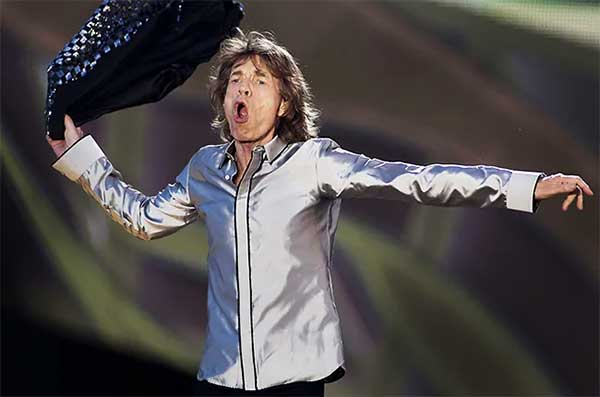
Mick Jagger has amassed a troublesome track record with his non-Rolling Stones projects, the aged rock icon turning out intermittent and indifferent solo albums, film performances, duets—the whole shot. Even to the most ardent Jagger partisan, the obvious is now clear: the good man’s musical instincts have found their best expressions in his partnership with fellow Rolling Stone Keith Richards. Richards seems the real musical genius behind this band’s amazingly resilient body of blistering, wickedly cynical rock and roll, and it’s due to him, I think, that they continue to release strong albums decades after their supposed “peak.” For instance, 2005’s A Bigger Bang caught me by surprise when I first played it. The trademarked weave of cranky, thundering guitar work by Richards and second guitarist Ron Wood fused quite ably, brilliantly even, around a set of riffs assembled with a jeweler’s touch. Jagger’s vocals—a signature mix of whimpering sobs and bull-moose roars—underscore the album’s unifying tone of hard-knocks hindsight and pampered fatalism, while Charlie Watts’ drum work kept it simple, hard, and steady. This album captures the sound the Stones have been famous for, transformed into a refined signature art: the sense of a massive apparatus of attitude and consequence teetering on the edge, the sheer weight of gathering gravity picking up speed, velocity, and undeniability.
Yet, Jagger did have one album, from all his years of attempting to create a musical style independent of the Stones, where his instincts found a comparable format. Much like his successful partnership with Richards, the key lay in his choice of collaborator. On Goddess in the Doorway, his 2001 solo effort, it was Lenny Kravitz who provided the spark. What makes Goddess in the Doorway worth the purchase is the fact that Jagger is singing better than he has in quite a spell; gone is the bellowing that characterized the corporate feeling of the last two decades of Stones releases, replaced with performances that highlight Jagger’s supreme gifts as a vocalist, even if he may be technically a poor singer. The distinction is key: a singer is someone who can hit the notes of a melody with trained precision and perhaps inject a dash of personality, but a vocalist like Jagger—alongside fellow mewlers like Dylan, Bowie, and Tom Waits—works brilliantly within their shredded, imperfect limits, creating memorable frontmen. On this album, Jagger again sounds alive and tuned to the screwy grooves of the tunes. Musically, the album is strong, with the electro-vibe of “Gun” percolating nicely under Jagger’s faux-sinister snarl and grunt, while the riff-happy “God Gave Me Everything I Want” is a slam-dunk of a hard rocker, Kravitz’s crashing guitars fueling the track against a solid drumbeat. Jagger’s vocal howls and twirls, even offering a brief, blasting harmonica riff toward the end that leaves a lasting impact. However, the effect is somewhat diminished by the album’s lyrics, which slip into a tedious assortment of greeting-card, web-page poetry—unexceptional expressions of love and its fractured derivatives. Jagger’s stylized narcissism and limited talent for reflection or writing about others become evident, but the album nonetheless stands as his most successful solo effort.
Revisiting old albums, especially the Stones’ monumental Let It Bleed and Exile on Main Street, offers a reminder of the particular genius of Mick Jagger’s vocal style. One could wax poetic about how these songs capture a moment when the invisible fabric holding reality together threatened to unravel, urging us to listen and act on the philosophical irony our millionaire visionaries were laying out. Yet, beyond such musings, it’s important to appreciate Jagger’s unique way of articulating, mumbling, growling, and mewling lyrics. Jagger is a vocalist who learned to work brilliantly with the limited singing ability he possessed. Instead of attempting to imitate Muddy Waters or Wilson Pickett, he invented his own style: talk-singing, whiny purrs, bull-moose grunts, roars, grunts and groans, slurs and little noises—all orchestrated into unforgettable performances.
Jean-Luc Godard’s film One Plus One (Sympathy for the Devil) perfectly captures this process, showing the irresolute tedium of studio existence and, more importantly, Jagger piecing together his vocal delivery. We witness his voice, awful in its raw state, gradually become bolder through endless jamming. By the final take, Jagger, isolated with headphones, screams his head off into the microphone, transforming his marginal instrument into something riveting. This places him in a grand tradition of white performers—like Mose Allison, Van Morrison, Felix Cavaliere, Eric Burdon, and Peter Wolf—who, unable to sound authentically black, nevertheless molded a credible, black-nuanced singing style all their own.
Keith Richards’ contribution to Jagger’s success as a vocalist cannot be underestimated. Someone needed to write tunes Jagger could handle, and Richards excelled at this, his guitar work riffing and staggering in ways that perfectly matched Jagger’s strutting and mincing. As always, writing is everything. John Fogerty, for example, is influenced by black music and his voice simulates an idealized southern black patois, but it’s the songs themselves that make Creedence Clearwater Revival matter. Fogerty, like Chuck Berry, crafts short, punchy tunes with stories to tell, rather than philosophy to impose or depression to share. In the end, the enduring genius of Mick Jagger’s artistry lies in his ability to transform his vocal limitations into strengths, crafting unique performances that are inseparable from the music written for him—most notably by Keith Richards. While his solo ventures often fell short, moments of brilliance emerge when the right collaboration is found. It is within the context of the Rolling Stones, with Richards’ songwriting and the band’s collective chemistry, that Jagger’s inimitable vocal style truly finds its place, solidifying his legacy as one of rock’s most compelling frontmen.
.
By Ted Burke
.
